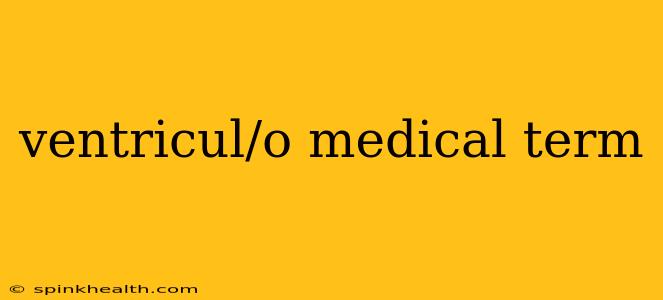Ventricul/o: Unveiling the Secrets of the Heart's Chambers
The medical term "ventricul/o" might sound intimidating, but it simply refers to the ventricles of the heart. Imagine the heart as a powerful pump, tirelessly working to circulate blood throughout your body. This remarkable organ is divided into four chambers: two atria (the receiving chambers) and two ventricles (the pumping chambers). Understanding "ventricul/o" is key to understanding a significant portion of cardiovascular terminology. Let's dive deeper into this fascinating anatomical detail.
What exactly does ventricul/o mean?
Ventricul/o is a combining form in medical terminology. It's derived from the Latin word "ventriculus," meaning "little belly" – a fitting description given the ventricles' shape and function. In the context of medicine, ventricul/o specifically points to the ventricles of the heart. These powerful muscular chambers are responsible for pumping oxygenated blood to the rest of the body (left ventricle) and deoxygenated blood to the lungs (right ventricle).
What are the ventricles of the heart?
The heart possesses two ventricles:
-
The right ventricle: This chamber receives deoxygenated blood from the right atrium and pumps it to the lungs via the pulmonary artery. In the lungs, the blood picks up oxygen and releases carbon dioxide.
-
The left ventricle: This is the heart's most powerful chamber. It receives oxygenated blood from the left atrium and pumps it to the rest of the body via the aorta, the body's largest artery.
Understanding the distinction between the right and left ventricles is crucial for comprehending various heart conditions.
What medical terms use ventricul/o?
The combining form "ventricul/o" appears in numerous medical terms, often describing conditions or procedures related to the ventricles. Some examples include:
-
Ventricular fibrillation: A life-threatening heart rhythm disorder where the ventricles quiver instead of beating effectively, disrupting blood flow.
-
Ventricular tachycardia: A rapid heartbeat originating in the ventricles, which can also be life-threatening if prolonged.
-
Ventricular septal defect (VSD): A congenital heart defect where there's a hole in the wall (septum) separating the ventricles.
-
Ventriculomegaly: Enlargement of one or both ventricles, often associated with neurological conditions.
-
Ventricular assist device (VAD): A mechanical pump that helps a weakened ventricle pump blood.
What are some common conditions affecting the ventricles?
Several conditions can affect the ventricles, leading to various symptoms and complications. These include:
-
Heart failure: A condition where the heart can't pump enough blood to meet the body's needs. Ventricular dysfunction is a common cause.
-
Cardiomyopathy: Diseases that weaken or thicken the heart muscle, often impacting the ventricles' ability to pump blood effectively.
-
Myocarditis: Inflammation of the heart muscle that can damage the ventricles.
-
Arrhythmias: Irregular heartbeats originating from the ventricles can lead to dangerous consequences.
Accurate diagnosis and timely treatment are crucial for managing ventricular-related conditions.
How are ventricular problems diagnosed?
Diagnosing ventricular issues involves a combination of techniques, including:
-
Electrocardiogram (ECG or EKG): Measures the heart's electrical activity to detect arrhythmias and other abnormalities.
-
Echocardiogram: Uses ultrasound to visualize the heart's structure and function, providing detailed information about the ventricles.
-
Cardiac catheterization: A procedure involving inserting a catheter into a blood vessel to reach the heart, allowing for measurements of pressure and blood flow within the ventricles.
This exploration of "ventricul/o" offers a glimpse into the complexities of the heart's ventricles. Understanding this combining form helps demystify medical jargon and aids in comprehending various cardiovascular conditions and procedures. Remember to always consult a medical professional for any health concerns.

